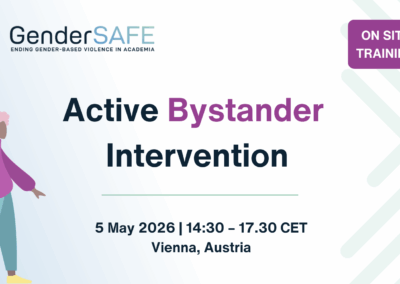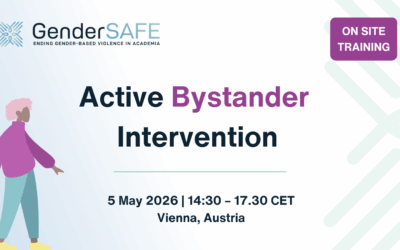When working to promote and implement effective responses to gender-based violence, change agents come across all sorts of resistances… This blog series aims to provide support by reframing arguments commonly encountered and help navigate challenging conversations with clarity, confidence and purpose. Drawing on the principles of strategic framing, this resource provides a better understanding and anticipation of common forms of resistance, as well as evidence-based, values-aligned messaging.
Many institutions believe that addressing gender-based violence would harm their reputation. In reality, the greater reputational risk lies in failing to address gender-based violence, not in confronting it. Cases of gender-based violence that emerge publicly, particularly when mishandled, can lead to significant reputational fallout, legal challenges, and loss of confidence among key stakeholders.
The UniSAFE project highlights that institutional responses perceived as opaque, dismissive or overly protective of perpetrators increase secondary victimisation and escalate reputational damage. Conversely, institutions that show clear protocols, visible leadership commitment and consistent support for victims/survivors are more likely to be seen as trustworthy and progressive. Acknowledging the problem and taking action is a sign of strength, not weakness.
“The cost of transparency is far lower
than the cost of cover-ups.”
Institutions that lead on transparency and reform set the tone for the sector and attract both internal trust and external recognition. Many award bodies and international rankings increasingly reward progress in diversity, equity and inclusion of which gender-based violence prevention is a core component. Addressing gender-based violence should not be seen as reputational risk management, but as part of the institution’s ethical identity. In a context of heightened public scrutiny and student activism, doing the right thing is also a smart strategy.
- “A responsible institution acts before a scandal forces it to.”
- “Students and staff trust institutions that tell the truth even when it’s difficult.”
- “Being proactive is not only ethical; it’s strategic.”
Change agents can shift the narrative from fear to leadership by framing transparency and proactive engagement as key to institutional credibility. They can prepare leadership to respond confidently to reputational concerns by showing that prevention, not silence, is what builds trust. By connecting action on gender-based violence to values of integrity and long-term reputational strength, they help institutions move from reactive crisis management to strategic, valuesdriven governance.
Understanding the Resistance
Institutions that actively engage with the issue demonstrate integrity, accountability and care qualities that strengthen public trust and institutional credibility. Avoidance, trivialisation, silence or denial, especially in the face of visible cases or media scrutiny, can seriously damage an institution’s standing with students, staff, funders and the broader public. This form of resistance often arises from fear: fear of negative press, legal implications or loss of student applications or donor confidence. In many cases, the concern is not reputational harm itself, but a lack of control over the narrative. Institutions must learn to communicate about gender-based violence in ways that show care, action and commitment, rather than denial or damage control.
Communicating with different stakeholders
- To leadership: Present case studies where transparency improved institutional reputation and where silence led to crises.
- To students and staff: Reassure them that speaking out and taking action are signs of institutional health, not risk.
- To the public: Emphasise the institution’s role as a leader in shaping safe, inclusive academic spaces both locally and globally.






